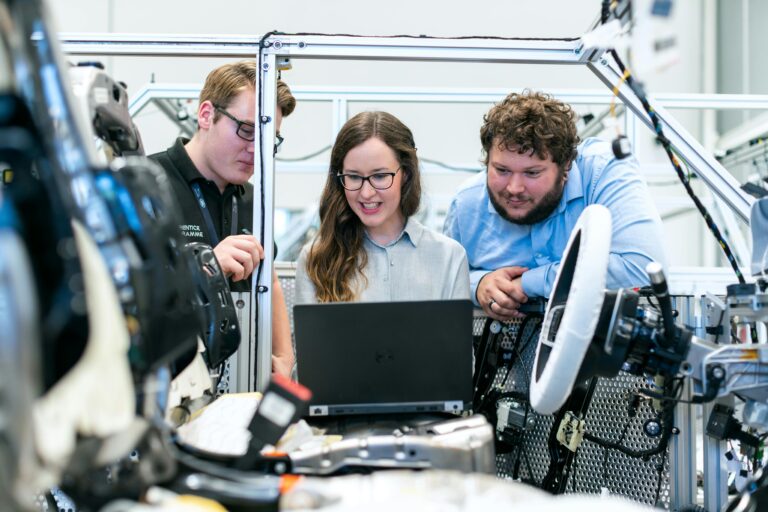
Industrial engineers have a rich history of shaping industries — from Henry Ford’s assembly line to Tim Cook’s leadership at Apple. But how can aspiring industrial engineers stay ahead in a rapidly evolving field?
A master’s degree in Industrial Engineering is the answer. By acquiring one, you’ll be able to explore cutting-edge trends like artificial intelligence, robotics, and sustainable manufacturing. This advanced knowledge can help you adapt to employer and customer demands. And by applying these theories to real-world scenarios, you can hone your problem-solving, communication, and teamwork skills.
This mix of theory and practice can open doors to senior and managerial positions like project leader, operations manager, or consultant. The US Bureau of Labor Statistics reinforces rewards reserved for professionals, stating that industrial engineers with a master’s degree earned a median annual wage of US$102,550 in 2019, significantly higher than the US$88,950 earned by bachelor’s degree holders.
If you’re ready to invest in your future, here are two US universities offering advanced degrees in industrial engineering:
Purdue University
If you want to truly enhance your knowledge and skills in industrial engineering with a world-class education, come to Purdue University’s School of Industrial Engineering. Consistently proving its excellence, Purdue Engineering’s graduate program ranked fourth out of 220 universities in the US for the third consecutive year. At the same time, its online Master’s in Industrial Engineering has held the #1 spot for four years straight. Purdue’s commitment to affordability makes this level of excellence accessible. Their 13-year tuition freeze ensures you can obtain a top-ranked degree without breaking the bank. Everyone can benefit from this, considering the Professional Master’s Program was designed for students from both industrial and non-industrial engineering backgrounds.
For all of its learners, Purdue prioritises practical, real-world learning. Its Professional Master’s Program can equip you with the technical expertise of a traditional master’s degree, but it also goes a step further. Its curriculum emphasises the development of industry-vital skills like leadership, management, communication, client engagement, and project execution. Expect to hone these competencies by working on projects with Fortune Global 500 companies. The Professional Master’s Program also allows you to work on multiple industry-sponsored projects for up to three semesters while you are taking other advanced IE courses that nurture valuable business consulting skills.
Through comprehensive lessons, you’ll benefit from the knowledge and experience of Purdue’s faculty — most of whom boast over 30 years of global industrial senior management experience. Their insights and Purdue’s strong industry relationships can give you a direct advantage in the job market — evident in the success of its graduates.
Professional Master’s Program alumni typically earn 20% to 140% more than their bachelor’s degree counterparts. Today, some of them can be found at Amazon, Tesla, Intel, Micron Technology, Eaton, American Airlines, Eli Lilly, Salesforce, Applied Materials, and other major Fortune Global 500 companies. So, don’t wait. Come to Purdue, be a Boilermaker and join the ranks. Click here to learn more about the Professional Master’s Program.
University of California, Berkeley
UC Berkeley is known for offering an interdisciplinary, hands-on education. Nowhere is this more true than in its Industrial Engineering and Operations Research (IEOR) Department. Its graduate programs are aimed at helping students develop expertise in various fields, including artificial intelligence, healthcare technology, energy systems, finance, data science, and more.
There are several to choose from, including the Master of Analytics, Master of Engineering, Master of Science, and PhD. Each route emphasises a rigorous, interdisciplinary approach, ensuring graduates have the knowledge and skills to thrive in various settings.
Take the Master of Engineering program in Industrial Engineering & Operations Research, for example. It is a one-year, full-time program with a curriculum that combines business-oriented coursework with practical applications in optimisation analytics, risk modelling, simulation, and data analysis. New topics like machine learning and data science further enhance the program, equipping you with the expertise to manage complex projects and navigate financial and operational challenges.
Pair that with state-of-the-art facilities, labs and studios, and you’ll have invaluable hands-on experience. What’s more, Berkeley’s location in the heart of the Bay Area means students can collaborate in different teams, partner with industry leaders, and gain practical experience by tackling real-world projects under the guidance of esteemed faculty and industry experts. It’s little wonder why graduates land lucrative careers in Google, Apple, McKinsey, Deloitte, Ford, UPS and more.
*Some of the institutions featured in this article are commercial partners of Study International










